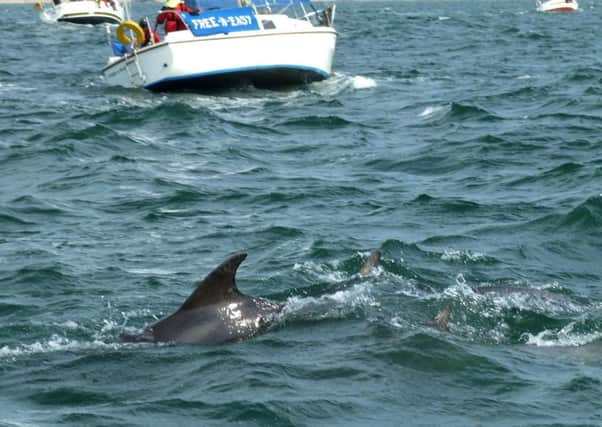Public asked to watch for sea mammals for national event
This article contains affiliate links. We may earn a small commission on items purchased through this article, but that does not affect our editorial judgement.


Organized by the Sea Watch Foundation, this annual event sees members of the public making valuable contributions to sea mammal conservation by watching for sea mammals in their area.
Now in its 16th year, National Whale and Dolphin Watch provides a valuable annual snapshot of sea mammal activity across the 35 UK regional groups and is part of the foundation’s ongoing observation programme to survey and protect UK dolphins and whales.
Advertisement
Hide AdAdvertisement
Hide AdSteve Savage, regional coordinator for Sussex, said: “The species most commonly seen off Sussex is the Bottlenose dolphin. They are a summer visitor to Sussex and can be seen as close as 100 m from the shore. Unfortunately you never know when they will be seen, which is why we monitor the coast with the help of volunteers. While bottlenose dolphins are the most common species seen in Sussex waters, we occasionally observe pilot whale, harbour porpoise and common dolphins. Local sightings are usually of small numbers but occasionally they are spotted in larger groups such as the 10 bottlenose dolphins spotted off Newhaven in May this year or the large groups of 30 bottlenose dolphins that passed Shoreham in 2016”.
Ongoing monitoring through the 35 regional groups and information gathered during National Whale and Dolphin Watch feeds into scientific discussions on trends and distribution to help develop effective conservation policies. In total, a surprising 29 species of dolphins, whales and porpoises have been recorded in UK and Irish waters, 12 of these during a National Whale and Dolphin Watch.
Dolphins face a number of threats including accidental capture in fishing nets, marine pollution including plastic debris, noise disturbance and depletion of fish stocks. They may also be affected by rising sea temperatures as a result of global climate change.
National Whale and Dolphin Watch runs until Sunday. For more information, visit www.seawatchfoundation.org.uk/nwdw-2017/ or report a sighting at [email protected].
Advertisement
Hide AdAdvertisement
Hide AdDon’t miss out on all the latest breaking news where you live.
Here are four ways you can be sure you’ll be amongst the first to know what’s going on.
1) Make our website your homepage at www.shorehamherald.co.uk/
2) Like our Facebook page at www.facebook.com/ShorehamHerald
3) Follow us on Twitter @Shoreham_Herald
Advertisement
Hide AdAdvertisement
Hide Ad4) Register with us by clicking on ‘sign in’ (top right corner). You can then receive our daily newsletter AND add your point of view to stories that you read here.
And do share with your family and friends - so they don’t miss out!
The Shoreham Herald - always the first with your local news.
Be part of it.